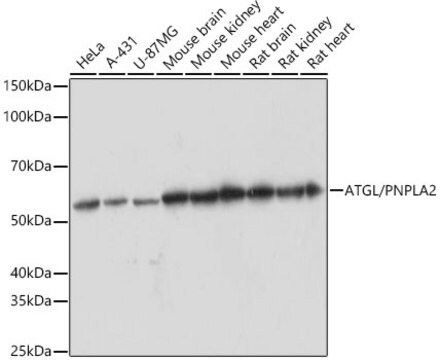SAB5801022
Alpaca Anti-Mouse IgG1(Fcγ) HRP single domain Antibody
recombinant Alpaca(VHH) Nano antibody
Sinónimos:
Recombinant Alpaca single variable domain secondary Nanobody
About This Item
Productos recomendados
biological source
alpaca
recombinant
expressed in E. coli
conjugate
horse radish peroxidase (HRP)
antibody form
affinity purified immunoglobulin
antibody product type
secondary antibodies
clone
recombinant monoclonal
form
lyophilized solid
mol wt
14 kDa
species reactivity
mouse, Alpaca
technique(s)
ELISA: 1:10000-1:50000
western blot: 1:10000-1:50000
size
0.1 mL
color
colorless
isotype
VHH
shipped in
wet ice
storage temp.
2-8°C
General description
Most monoclonal antibodies are generated in mouse. There are five antibody isotypes (IgA, IgD, IgE, IgG, and IgM) from mouse. Each isotype has a different heavy chain. Mouse IgG constitutes 75% of serum immunoglobulins, and IgG is the predominant form of first antibody produced from mouse. Mouse IgG consists of five subclasses-IgG1, IgG2a, IgG2b, IgG2c(inbred mouse strains with the Igh1-b allele have IgG2c isotype instead of IgG2a), IgG3. They are highly homologous and differ mainly in the hinge region. The whole IgG molecule possesses both the Fc region and the Fab region, which possessing the epitope-recognition site. The IgG contains two heavy and light chains, and the heavy chain is about 50 KD and the light chain is about 25 KD. The common IgG is monomeric with a molecular weight of approximately 150 kD.
VHH are single-domain antibodies derived from the variable regions of heavy chain of Camelidae immunoglobulin. The size of VHH is extremely small(less than15KDa) compared to other forms of antibody fragment, which significantly increase the permeability of VHH. Thus VHH is considered of great value for research, diagnostics and therapeutics.
Specificity
Isotype: VHH domain of alpaca IgG2b/2c
Immunogen
Packaging
Physical form
Reconstitution
Storage and Stability
Other Notes
¿No encuentra el producto adecuado?
Pruebe nuestro Herramienta de selección de productos.
signalword
Warning
hcodes
Hazard Classifications
Aquatic Chronic 3 - Skin Sens. 1
Storage Class
13 - Non Combustible Solids
wgk_germany
WGK 3
flash_point_f
Not applicable
flash_point_c
Not applicable
Certificados de análisis (COA)
Busque Certificados de análisis (COA) introduciendo el número de lote del producto. Los números de lote se encuentran en la etiqueta del producto después de las palabras «Lot» o «Batch»
¿Ya tiene este producto?
Encuentre la documentación para los productos que ha comprado recientemente en la Biblioteca de documentos.
Nuestro equipo de científicos tiene experiencia en todas las áreas de investigación: Ciencias de la vida, Ciencia de los materiales, Síntesis química, Cromatografía, Analítica y muchas otras.
Póngase en contacto con el Servicio técnico
